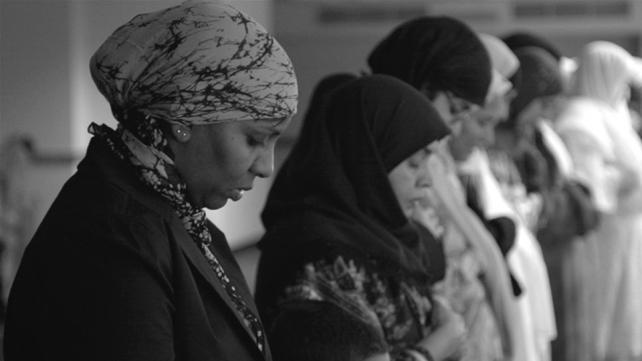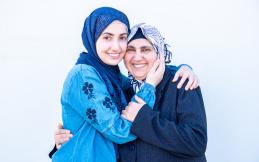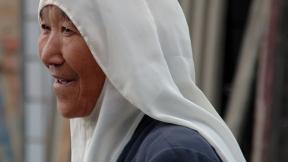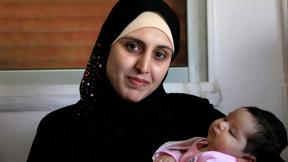
Last Friday, I was all set to give a Khutba about the need for Muslims to plan ahead on an individual and community level. My notes were ready and I was in full "Khutba mode". But before sermon time, I decided to change the topic completely -- to talk about the exclusion of Muslim women from the mosque and community life.
It wasn't an earth-shattering event that made me change the topic. It was an email. And it proved to be the proverbial straw that broke the camel's back. It was one of five emails I received last week about Islamic events with a clear "brothers only" statement. One notice for a regional conference even stated categorically that there was no space for women and children under 15 at the event.
But the emails were only part of the story. A week before, I had given a Khutba in another, brand-new mosque in the heart of Chicago. After the prayer, while in the elevator, I overheard four Muslim sisters speaking angrily about their experience in the Masjid.
"If I wanted to watch TV, I'd stay home," said one of the women, disgusted. I asked them what was wrong, and they told me how they could only see the Imam through a TV system set up in the women's section. Moreover, the space was inconvenient, uncomfortable and was changed twice that day. This was despite the fact that months ago, the leadership of this mosque had promised me that they would involve sisters in decision-making about how the women's space would be set up.
The Khutba
I was speaking in Chicago's oldest mosque where the main prayer hall accommodates about a thousand people. It has a small, curtained off space in the corner for about 40 or so women. Due to the sensitive nature of my topic, it did occur to me before the Khutba that I might not be invited to give a Friday sermon there in the future. Nonetheless, I made the following points and asked these questions:
Who decides how women's space in the mosque is allocated and organized?
How many women sit on the Board of Directors of our mosques?
If women are part of the Board of Directors, are they elected, chosen by women, selected by both men and women or are they simply the wives of male board members?
I also reminded the audience that in the Prophet's mosque, women could hear and see the Prophet Muhammad, peace and blessings are upon him, and later, the leaders of the Muslims (Khulafa) when they spoke from the pulpit. Actually there are reports of interaction with the Prophet when women raised questions. Caliph Omar even went back to give another sermon to withdraw his opinion when a women from the audience gave him critical feedback after his Khutba.
Moreover, when the Prophet felt that the women were too far away to hear or he had specific points to make, he would walk over to their section and present a Khutba for them.
Examples from Islamic history
Women in early Islamic history were active not just as "mothers and wives" but contributed as individual Muslim women in all aspects of the community.
On a scholarly level, there was Aisha, may God be pleased with her. She is credited with disseminating the knowledge of Islam and information about almost all aspects of Islamic life. Today, nearly half of the Islamic jurisprudence of the Hanafi school of thought (which is followed by about 70 percent of the Muslim world) comes through the students of Aisha alone.
On a political level, there was Umm Salama. During the signing of the Treaty of Hudaibiya, when none of the Muslim men agreed to forego Hajj due to the demands of the pagan Meccans, the Prophet consulted Umm Salama. Her advice to him was to perform the rituals indicating that they would not be performing the pilgrimage, and the Muslims would follow. He heeded her advice, and as she suggested, the Muslims accepted this.
After the death of the Prophet, one major issue was how to preserve the authenticity of the Quran. Although the Quran had always been committed to memory and writing, the written pages were scattered. When a master copy was put together at the time of the first Khalifa, Abu Bakr, that copy was not kept with him or any other Muslim man. It was kept with a woman -- Hafsa (may God be pleased with her).
Finally, in Madina during the leadership of Omar (may God be pleased with him) Al Shifa Bint Abdullah was made in charge of trade and commerce in the city.
These are just a few examples of the dynamic role women played in early Islamic history. But they are of no use if the inclusion of Muslim women in the mosque and community is reflected only in theory.
"Men's Islam" or Islam for All
While sisters are a full part of the community, many mosques are run as though Islam is just for men. This is evident by looking at women's spaces, their decoration, their uncomfortable size and design, the absence of women from the Board of Directors of most mosques and the relegation of their activism and ideas to a "women's committee".
Muslim women in North America are as professional as Muslim men and contribute as generously. I remember fundraising in a New Jersey Masjid. Five Muslim women contributed $25,000 each within the first 12 minutes. It inspired me to ask the audience: is there a man who can match these donations?
And that's how women's participation is. They know they will not get to Jannah because of the good deeds of their husbands. Each man and women has to find his or her own way to success in this world and next, knowing that God's promise is this:
"I will deny no man or woman among you the reward of their labors. You are the offspring of one another." (Quran 3:195).
"Each person shall reap the fruits of his/her own deeds: no soul shall bear another's burden." (Quran 6:164)
The Reaction to the Khutba
Normally, two or three people will approach me after a Khutba to thank and compliment me for it. This time, ten times more people came over, appreciating what I had said, Alhamdu lillah. That's one of the most positive instances of feedback I've ever gotten in years of giving Khutbas! Although I have yet to hear the response from the leadership of the Masjid, this gives me hope that the community is ready for change.
A few board members also spoke very positively about the points I raised, including one of the founding members. The question is, who is stopping the change?
Current Chicago Masjid Spaces for Women
In Chicago, I estimate that in about ten percent of the Friday prayer locations, there is proper space for sisters' participation. In these places men and women are in the same location without a curtain or wall separating them. In terms of the remaining 80 percent of mosques that do have a space for women, these are often cramped and inconvenient. By inconvenient, I mean that women cannot see the Imam or do not know what is happening in the congregational prayer. In about 10 percent of the Chicago-area mosques there are no spaces for women.
One Muslim sister in the city related to me her experience after visiting one of the largest mosques in Chicago that had an inconvenient room for women. When she entered the women's area, a group of sisters was standing in line, thinking prayer had started because the recitation of the Quran could be heard. Taking Quran recitation as a cue for congregational prayer, the sister joined the others in line. After several minutes, when the man ended his recitation without calling for the next step of prayer, Ruku, the women learned that it was not a prayer. Needless to say, the women were humiliated and upset about this confusing situation. This is just an example of the practical problems this segregation in prayer places causes.
An additional problem in mosques where women cannot see the Imam is the fact that the noise level often becomes unacceptable. This tends to be because most men dump the responsibility for taking care of their active children on their wives when they go to the men's section of mosque. Also, since women can't see what's going on, they end up talking to each other. This leads to the Imam asking women to "be quiet please," furthering tension and exclusion.
When women are out of sight, it's also more likely that they will be out of mind. That means their discourse and participation are ignored on a Masjid and community level. Moreover, few women have easy access to the Imam, which worsens the problem, since the Imam is the one man who can make a significant difference in bringing women's issues and problems to the attention of other Muslim men in the community. This perhaps explains why you don't normally hear many Khutbas on women's challenges here in America or abroad.
Negative Dawa
The situation becomes worse when non- Muslims visit. They see there are hardly any women present in the mosque. Or, if there are a few, they are confined to a small and less ceremonious corner. What kind of Dawa is this? What kind of impression does this give in our current context, where the battle against stereotypes is ten times harder than it was pre-9/11 America? This visual impact is far greater and far more lasting then tens of books lauding the status of women in Islam. Since Shahadah (witnessing) is the first pillar of Islam, this obstacle to outreach must be dealt with.
Of course, women, unlike men, are given a choice by the Prophet to pray at home or in the mosque. But the Prophet was categorical in telling men "do not stop women from coming to the Masjid." Friday prayers are also optional for women. But considering that Friday sermons are the only Islamic educational opportunity available to most women in the North America Muslim women should attend Friday prayers. This is especially important because we do not yet have a widespread tradition of female teachers, as is the case in the Muslim world. I am pretty sure Caliph Omar would have encouraged Friday prayer attendance by women if he was alive today in the United States, may God be pleased with him.
Who is stopping women from the Masjid
Knowing both of these Masjids, their volunteer leadership, and the fact that women are on their boards, I don't think either of them stops women from attending and participating. The first Masjid's president did make an announcement twice in front of me inviting women to visit the new location to help determine the sisters' space. I think, perhaps, need sisters taking these issues more seriously instead of accepting the current situation.
In the second Masjid, I learned that some sisters prefer to pray behind a curtain. An easy solution could be to make a larger area where women who do not want a curtain between the men and women, as was the practice in the mosque of the Prophet, can pray. Behind them, women who are comfortable praying behind a curtain can do this.
With lower donations as a result of donor chasing by the FBI, extra expenses for security and legal battles, which six or seven Masjids in the Chicago-area are going through, the last thing on the mind of Muslim leadership is women's space. About 80 percent of the Masjids in the Chicago area do not have any permanent Imam. Volunteers like me are asked to offer the Friday sermon on a rotational basis. Almost all of these Masjids' leaders are busy professionals who volunteer their time to run the community centers, schools and Masjids. Unless someone is pushing for something, things will continue as they have been.
This is why I have come to the conclusion that the agenda of women's space will not come to the forefront unless Muslim women take it upon themselves.
Establishing a Muslim Women's Caucus
It is time that sisters come together and provide leadership in clearly defining a Muslim women's manifesto for change in mosques in North America. If these sisters are practicing Muslims, they will have a far higher level of success in demanding change and leading it.
I would like to make a plea to leading Muslim women in North America who are respected and honored by the community to call a national women's caucus on these issues. In this conference, the following things need to be discussed and tackled:
1. An agenda outlining change in the Muslim community centers and Masjids in which
- Each Masjid should formally declare that it is unIslamic to stop women from attending a mosque
- The need to restore women's space in the mosque as it was at the Prophet's time (i.e. without a curtain or a wall separating men and women) is stressed
- Develop a welcoming space where they have a clear view of the Imam
2. One-third of Masjids' Board of Directors should be composed of sisters, one-third of brothers, and one-third of people born in North America.
3. A mechanism for an ongoing Muslim Women's Caucus needs to be developed
On the issue of women's exclusion from the mosque, this Muslim Women's Caucus may want to do the following:
- Invite the leadership of major mosques, as well as national and continental Muslim organizations to a closed-door dialogue with an equal number of Muslim women leaders present.
- Give a deadline to all Masjids that do not have a space for women to allocate one in consultation with women.
- If space is extremely limited and there is no cultural and ideological objection to it, then allocate time for additional congregational prayer for women lead by women as was done by Umm Waraqa with the Prophet's permission when she lead her staff regularly in prayers in her own home as reported by Sahih Abu Dawud. (If thousands of women lead other women in prayers throughout Pakistan, it can be done in a mosque here as well).
Shura (consultation) has been a way of life for Muslims (42:38). If our families and our communities are not run on Shura, open communication and proper representation, how will we grow?
"The true believers, both men and women, are friends to each other. They enjoin what is just and forbid what is evil; they attend to their prayers and pay the alms and obey God and His apostle. On these God will have mercy. He is Mighty and Wise." (Quran 7:71)
Photo Attribution: Beth Rankin (BohPhoto) - http://commons.wikimedia.org/wiki/File:Islamic_Society_of_Akron_%26_Kent_-_women_jummah_prayer.jpg








Comments
Asalamu-alakum brother,may Allah bless you for your khutba.I agreed with you,even you didn`t say what Hadidh and Narrow you were talking about in your Khutba. you talked about one side of the story,You shoud pay attention when you go to a Mosque were women pray in the same place with men,and see women dressed and sitting in an unrespectful manner ,atractting the men atention
Location
As Salaam Alaikum. I enjoyed this article. I was born in this country, and I was raised to believe that women are just as talented and gifted as men. Women can offer a greater service to our families and society when we are educated and allowed to express the gifts that Allah gave us to glorify Him. It is also hard for Muslim mothers to really teach love of Islam to our children, when deep inside we are treated as second class human beings in the name of Islam. As women, we have to demand our rights from the men. We must not allow anyone to take from us what Allah has already given us. Brother, May Allah bless you for your courage and sincere concern for women.
Location
Assalamu Alaikum Bro. Mujahid. Thank you for the excellent Khutbah. May Allah (SWT) reward you. I read this article some time ago and have not had time to respond until now. Over the years I have had heartbreaking experiences, many while traveling with my husband, where he had the opportunity to pray in the Masjid and I was left to my own creativity in finding a space. Many times the result was to pray in our automobile. I heard a very good Khutbah this past Friday at Community Mosque in Winston-Salem addressing this same issue, Alhumdulillah. I pray that the example set by you and the Imam in WS is followed until the issue of space for Sisters in the Masjid is no longer an issue and women and children are free to attend as frequently as they would like.
Location
What a great article!!! May God greatly reward you for your efforts, and soundvision for taking on this urgent issue. As the Chinese say, "women hold up half the sky"... How impoverished the muslim community is when women are excluded or marginalized - what a loss of the contributions we could make and the benefits we could get in terms of learning and worship, outreach and advocacy, etc. Our best example is that which the Prophet (may God bless him) left for us---and this includes praying and learning as one community! I think efforts to remedy this are so essential --- and it's especially important that our brothers join us in raising their voices on this issue, as brother Abdul Malik has done so eloquently. Thank you, thank you, thank you.
Location
Hooray for this article! After being told once that I had to pray in the bathroom because the men were overtaking the "women's space" (actually just a curtained off area big enough for 3), I stopped trying to go to NYC mosques. Maybe now we can talk about race discrimination in the mosque...
Location
Dear Lydia Muhammad, I live in the Chicago area. I read your comment and story, and I became sad. I'm sorry to say that such descimination is what drove me away from practicing. If you decide u want to create a petition, I would be happy to be one of many to sign. Something definately must be done to combat the ignorance we women still face in this so-called liberal society. If that doesn't work to change the minds off the men who maintain the Sheridan-Foster mesjid, then maybe consider starting one of your own. Get friends and relatives to come together at your home, or the home of someone close to u for jummah prayer and Islamic discussion. Then slowly expand from there. We women are no longer just mother's, wives and daughters. We are intellectuals with ideas, contributions and goals. (Thanx so much Sound-Vision for providing such important information and discussion)M.
Location
Alhumdulillah! at long last , I was beginning to think maybe it was just me.Maybe I didn't understand ? In 1987 a group of sister's spoke out about this subject and others, not allowing the women to be heard in the Mosque among other things. Now 20 years later and we are finally speaking out about the sad state women are forced to accept. I was told that if we make a fuss we won't have a place to pray because we were not obligated to pray in the mosque.Many other reasons were given . Thank for expressing what has now been in my heart for a long time.May Allah(SWA) help us and guide us Amin.Zarinah
Location
Salaam alaiykum to you. Read with interest your article which voiced my concerns so nicely and all the comments. Bless you for addressing the real issue. We need more than just action, we need PRAYERS for the narrow minded people who cannot keep their own fitnas within their boundries that they have to marginalize half of Allah's creation. When are we going to change?? We STILL did not learn our lesson. In particular the comment from a Canadian brother is the most upsetting. Allah help us all.
Location
May God bless all those who support women's rights and open the eyes of the rest of humanity to the advantages it brings to our society. The masjid I attend in West Springfield suffers the same problems mentioned above. Many women are deterred from ever coming back after their first visit. In addition to the issue of inequality in space, women are often faced with hostile words by some of the ignorant male goers if they dared to step into the male space. Islam teaches love and kindness not hatred and violence. My approach to reclaiming my right to being close to God and his house of worship is simply gathering all the courage I can find to walk through that door and claim my place in the main hall where I can see, hear and take an active part in prayer in addition to having access the great many copies of Quran and Hadith books available only there. I invite all my muslim sisters to join me in this peaceful demonstration of our God given right to be an equal spiritual being to that of our male counterparts. And I invite my muslim brothers to be vigilant in stopping other men from acting hostile and stepping in the way of the muslim women's taking an active part. Race discrimination was first confronted in the US by the simple act of a black woman who refused to get up from her seat in the bus, in this case we can refuse to get up from our seat in the mosque.Peace
Location
I have long expressed the exact same views and they have fallen upon deaf ears. It seems that women are tolerated evils of Islam. I have been reprimanded many times for approaching this subject. I wish you would come to our area and speak on this subject. Inshallah your voice will be heard here.
Location
Pages
Add new comment